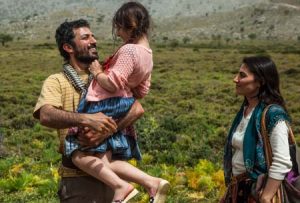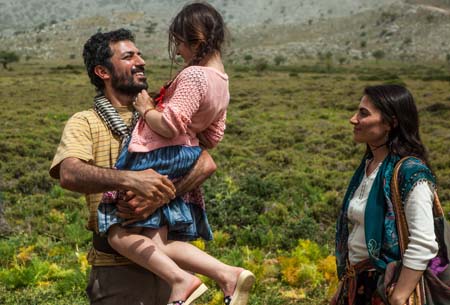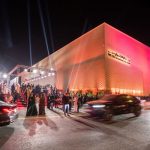The Dubai International Film Festival (DIFF) has revealed the first films that will feature in the Muhr Feature category. Held within the Festival from 6 13 December 2017, the Muhr Awards celebrate standout regional talents whose work highlights and explores the traditions and culture of the diverse Arab world. Since 2006, DIFF has brought […]
 The Dubai International Film Festival (DIFF) has revealed the first films that will feature in the Muhr Feature category. Held within the Festival from 6 13 December 2017, the Muhr Awards celebrate standout regional talents whose work highlights and explores the traditions and culture of the diverse Arab world.
The Dubai International Film Festival (DIFF) has revealed the first films that will feature in the Muhr Feature category. Held within the Festival from 6 13 December 2017, the Muhr Awards celebrate standout regional talents whose work highlights and explores the traditions and culture of the diverse Arab world.
Since 2006, DIFF has brought together the best in local and regional short and feature-length films for the Muhr Awards. Designed to highlight and nurture cinematic talent from around the Arab world, the competitive lineup will have their entries screened for DIFF audiences and judged by a prestigious jury panel. Entrants stand the chance of winning funding to help further their filmmaking talent. Films selected for the Muhr Feature programme are in the running for the following categories: Best Muhr Fiction Feature, Best Muhr Non-Fiction Feature, Special Jury Prize Muhr Feature (Fiction or Non- Fiction), Best Director, Best Actor and Best Actress.
The first feature film shortlisted for the Muhr competition comes from Algerian filmmaker Yasmine Chouikh who brings the world premiere of her first feature, Until the End of Time. The film supported by Enjaaz, DIFFs post-production programme tells the story of the Ziara, a time of year during which families come to visit their dead. Ali, a seventy-year-old gravedigger, watches each Ziara pass, but this year changes when Joher, a sixty-year-old woman, arrives to visit her sisters grave. Whilst there she makes the decision to finally rest beside her and requests Alis assistance. The film watches as two souls discover each other over the theatre of death.
Egyptian filmmaker Hala Elkoussy presents Cactus Flower, also supported by Enjaaz, the film follows the journey and personal struggles of three Egyptians. Aida, a struggling actress who came to Cairo from the Delta, is kicked out on the street on the same night as her neighbour, Samiha, a fading bourgeois beauty. With no money and nowhere to go, the two women, aided by Yassin, a street-savvy youth, and form an unlikely friendship. Together they embark on a journey through a mentally and physically difficult terrain.
Returning to DIFF this year is acclaimed Moroccan director Nabil Ayouch with his feature film Razzia, Morocco’s candidate in the foreign-language category of the 2018 Academy Awards. Razzia follows five different characters in the streets of Casablanca, whose lives dramatically interfere and collide into one. Spanning different decades and several storylines, the film weaves an intricate tale of lost loves, forbidden desires, and fragile dreams in modern day Morocco.
Joining Ayouch is internationally acclaimed director Annemarie Jacir, who returns to the Festival with her latest feature, winner of the Don Quixote Award at Locarno Film Festival and this year’s Palestinian Oscar entry, Wajib. The heart-warming story of the rediscovery and reconciliation of a troubled father-son relationship, Wajib follows a day in the life of Abu Shadi and his son Shadi. With his sisters wedding a month away, Shadi travels from his job as an architect in Rome to help his father in the customary hand-delivery of the wedding invitations. As the estranged pair spend the day together, the tense details of their relationship come to a head, challenging their fragile and very different lives.
Known for his socio-political storytelling, Lebanese director Lucien Bourjeily brings to DIFF a journey of unspoken hurt and the rift it can cause with the world premiere of Heaven without People. For the first time in two years, Josephine, the matriarch of a sprawling family, is delighted to gather everyone together for Easter lunch. The joyful meal survives tensions bubbling just under the surface, but an unexpected event will soon change their festive mood and lives forever.
Syrian filmmaker Feras Fayyad makes his DIFF debut with Last Men in Aleppo, winner of the Sundance Grand Jury Prize. The film takes place five years into the war in Syria, as the remaining citizens in Aleppo are readying themselves for a siege. Told through the eyes and ears of a White Helmets volunteer, audiences will witness the daily life, death and struggle in the streets of the city. They fight for sanity where war has become the norm.
Lebanese filmmaker Rana Eid premieres her latest feature film Panoptic which was supported by Enjaaz, a film about her native Beirut. Beneath the glittering facade of modern Beirut are still traces of the citys violent history. Panoptic is a journey into the underground layers of Beirut, as they unfold and reconcile with the past.
From award-winning Iraqi filmmaker Mohamed Jabrah Al-Daradji comes The Journey, a feature film about the chance encounter between two strangers in Baghdads central station. The beautiful and mysterious Sara runs into the train station and bumps into self-assured and flirtatious salesman, Salam. When he learns that Sara has a suicide bomb strapped to her stomach, and is unwillingly taken hostage, Salam tries to understand Saras motives while also figuring out how he is going to save himself and everyone else at the station.
Festival regular and award-winning Kurdish director Sahim Omar Kalifa premieres his highy anticipated first feature film, Zagros. It tells the story of a Kurdish shepherds wife, Havin, who is forced to flee to Belgium when she is accused of having an affair. Her husband Zagros believes her innocence and follows her to the West, only to be plagued by doubt and suspicion once there.
DIFFs Artistic Director, Masoud Amralla Al Ali, spoke on the feature lineup for the Muhr programme: This years lineup of feature films will continue the tradition of presenting the creativity and brilliance of our regional filmmakers, helping further fuel the rise of cinema within the region. The selection of films already shortlisted spans a remarkable mix of talented filmmakers who have all used their craft to share the perspective of the Arab worlds unique history and culture.
Antoine Khalife, Director of the Arab Programme, added: The work we are seeing in this years Muhr feature selection explores contemporary issues in the context of the regions political climate. The filmmakers explore themes including identity, marginalisation and self-discovery as their protagonists find themselves in difficult, troubled times and embark on a journey of discovery and understanding. The compelling stories are sure to captivate all audiences this December.
















































































